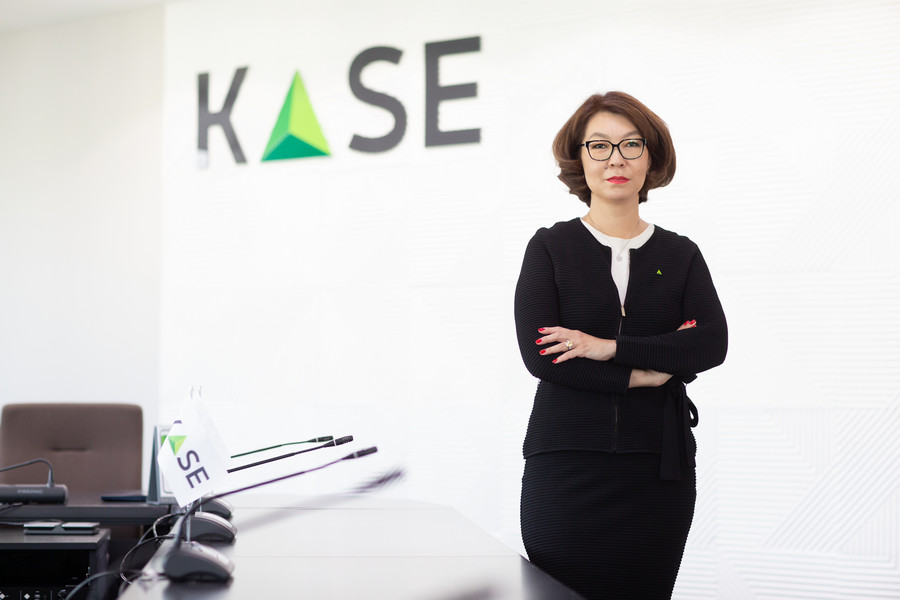KASE Management Board Chairperson Alina ALDAMBERGEN:
KAZAKHSTANI ISSUERS' SECURITIES PRICES ARE KEPT AT A HIGHER LEVEL ON THE KASE THAN ON INTERNATIONAL PLATFORMS DURING THE PERIOD OF TURBULENCE

Against the backdrop of geopolitical events in the world and January events in Kazakhstan, the KASE index lost 27.2% in the first six months, while in 2021 the growth exceeded 37%. Chairperson of the KASE Management Board Alina ALDAMBERGEN talked how the Kazakhstan Stock Exchange has been developing in 2022, on which platforms Kazakhstani issuers ' securities are more expensive during spells of turbulence.
- Alina Utemisovna, in the first half of the year there were several key events that affected the economy of Kazakhstan. Tell us how these events affected the exchange market?
- In 2021, against the background of the post-pandemic recovery of economies and growth in consumption, the stock markets in many countries, including Kazakhstan, recorded historical highs. But in the first half of 2022, most indices showed a significant drop, faced with a number of factors, such as inflation acceleration, the containment policies of central banks, and impact of geopolitical risks. In an attempt to curb inflationary pressure since the beginning of the year most central banks have already proceeded to raise rates and reduce asset buyback programs in secondary markets, which created preconditions for slowing economic growth, as well as recession risks. China's economic growth slowdown amid lockdowns due to new COVID-19 outbreaks added additional fears for investors, and as a consequence , interruptions of supplies from Chinese plants. All this contributed to the fact that, in the first half of the year, the stock indices in both developed and developing countries were exposed to a strong adjustment. The KASE index decreased 27.2% to 2,674.72 points as of July 1, 2022.
In early January, in addition to the global adjustment of stock markets, country risks for Kazakhstan increased sharply, exposing GDRs to a strong correction with regard to the shares of a number of index companies. Following a decline in GDR prices, in January ordinary shares of Halyk Bank and Kazatomprom lost 18.2% and 16.1% [in value] respectively. Share prices of the other index basket representatives were not exposed to such a significant correction in the aftermath of the January events and held the index from a strong decline (the index fell by 3.4% in January).
At the end of February the geopolitical situation deterioration in the region led to a decrease in all the index basket shares (a decrease of 5.3%).
In March, the local market saw a recovery due to the start of the publication of financial results for 2021 and the expectation of dividend payments.
Against the backdrop of ongoing uncertainty, stockholders of index companies one by one announced their decisions to reduce, postpone or cancel dividend payments with the aim of accumulating net profit in-house.
In June, the publication of quarterly reports was completed, which turned out to be at the level of market expectations. By and large, the realized dividend season, good quarterly reports and affirmation of ratings by international rating agencies enabled the KASE index to reverse the May-June negative trend and ended the month with nine consecutive sessions of growth. After seven consecutive months of decline, the index closed up 0.5% in June.
- According to your forecast, how will the KASE index change in 2022?
- Given the results of the index companies for the 1st quarter and 1st half-year reports, the fundamentals remain strong, and the net income of many of them significantly exceeds last year's values of the. High prices in the markets of raw materials and food products propped up domestic export-oriented companies.
On the other hand, inflation remains high worldwide global growth has slowed down, geopolitical tensions are growing, and problems in supply chains remain. In addition, leading central banks are only at the beginning of the monetary tightening cycle.
Thus, multidirectional factors are acting, which do not allow predicting unequivocally the trend for the second half of the year.
- Is the cost of securities of Kazakhstani issuers correlated on international platforms and on the KASE?
- The cost of ordinary shares on the KASE and GDRs on the LSE has a high level of correlation and the difference arises from transaction costs. During the period of turbulence on international stock exchanges, the assessment of specific country risks, investors' preferences during investment in developing countries matter, therefore, the prices on the Kazakhstan stock exchange during such periods usually remain higher due to the domestic investors' support. The range expansion also takes place in the short term due to the exchange rate differences. In the long term, this difference levels off.
- What problems can you point out which have affected the exchange activity? What operational measures were taken by the exchange within the framework of internal and external factors?
- Amid the ever changing geopolitical situation and international exchange market conditions, increasing base rates, our central counterparty swiftly took measures aimed at minimizing both emerging risks and potentially possible risks.
In particular, when restrictive measures are introduced by the central counterparty, the risks of trading in certain financial tools due to a drop in liquidity in the exchange market, as well as the ability of counterparties to fulfill their obligations were analyzed.
In general, thanks to a risk management system being effectively built up, the central counterparty took necessary measures beforehand as part of monitoring for compliance with requirements for the reliability of participants in deals in order to minimize the consequences including a number of second tier banks in the sanctions lists. Thanks to these measures, the regulation of open positions of these entities had no impact on remaining participants. In addition, a number of securities were excluded from the list accepted as collateral for deals concluded on the terms of partial collateral, and some were transferred from the category of securities traded on the terms of partial collateral to the category with complete pre-delivery.
Also, a gradual increase in market risk rates was carried out on the KASE exchange markets, which, in turn, made it possible to form up additional collateral in terms of clearing participants' obligations.
- How does the KASE, in general, assess the perception of the global trend towards promoting ESG principles in Kazakhstan today?
- The deterioration of the environmental situation worldwide, global warming, the COVID-19 pandemic boosted the attention of the international community to the need to improve the environment, mitigate the climate change effects and use resources more efficiently, thereby contributing to the development and popularization of green financial instruments, whereby both environmental and social projects are funded. Such projects serve as a conduit for the long-term development, are designed to protect the environment, envisage complying with high social standards, and also expand the horizons for attracting foreign investment.
These trends stipulate fundamental changes in the global financial markets, lead to a new regime of international cooperation, transition of business models to more sustainable ones.
Kazakhstan, being part of the global progressive community, did not stand aside.
A new Environmental Code was adopted in order to implement sustainable development objectives in Kazakhstan, which entered into effect on July 1, 2021. The document provides for incentives for enterprises to upgrade production through the use of indicators of best available technologies based on experiences of the EU countries.
For its part the exchange joined the UN Sustainable Stock Exchanges initiative back in 2015 and committed itself to developing and implementing a methodology for compiling reports on environmental, social responsibility and corporate governance criteria among its [member] companies. Since then we have consistently implemented these principles, initially as part of advisory measures, and for the time being provision of information in line with ESG principles are already an integral part of the annual reports from major listed companies.
- Can you talk through placements on the KASE of "green" and social securities of Kazakhstani and international companies.
- In 2021, the KASE formed infrastructure for listing and placement of "green", social and other bonds issued to fund sustainable development projects (ESG bonds). In particular, terms and conditions for listing such securities, terms and conditions for verifying bond issues and disclosing information about these projects were determined.
The KASE provides incentives for payments of listing fees to issuers of sustainable development bonds in order to develop ESG areas in the stock market.
This year the Asian Development Bank (ADB) placed social bonds totaling 14 billion tenge with a target purpose of investing in projects aimed at narrowing gender inequality, expanding rights and opportunities for women and girls.
In addition, ADB already placed two green bonds issues on the KASE totaling 14 billion tenge, the target purpose of which is to fund climate change adaptation and mitigation projects in Kazakhstan, as well as one social (gender) bonds issue worth 22.4 billion tenge.
In September 2021, social bonds of Damu Entrepreneurship Development Fund JSC worth 1 billion tenge were placed on the KASE to finance small and medium-sized businesses from the economic sectors most affected during the COVID-19 pandemic.
The Eurasian Development Bank placed two ESG bond issues totaling 40 billion tenge on the KASE : "green" bonds to finance ESG projects in Kazakhstan, as well as social bonds with the aim of financing social projects.
Thus, currently seven ESG bond issues have already been included in the KASE official listing: three "green" bonds issues totaling 34 billion tenge and four social bonds issues exceeding 43 billion tenge.
- Thank you for the interview!
August, 2022
© 2025 Interfax-Kazakhstan news agency
Copying and use of these materials without reference to the source is prohibited
Archive






